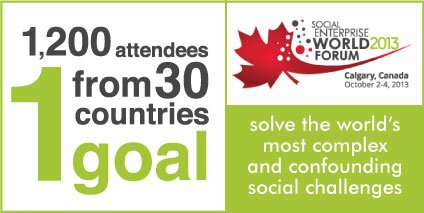Persistence, Underwritten by Hope
By Milton Friesen, Program Director - Social Cities, Cardus
This story originally appeared on Cardus Daily's website.
Milton Friesen will be attending SEWF 2013.
Al Etmanski, Co-founder, Planned Lifetime Advocacy Network, will be speaking at the SEWF 2013 sessions "A Matter of Impact: Key Skillsets", "Finance Solutions Lab A) Poverty Reduction: Multi-sector Approaches to Complex System Change" and "Finance Solutions Lab B) Environmental, Sustainable Food, Youth Education: Multi-sector Approaches to Complex System Change."
People that enjoyed this article may wish to check out the SEWF 2013 program streams "Social Innovation."
SEWF 2013 is reposting this article as part of an ongoing series of articles by or about SEWF 2013 attendees.
SEWF 2013 has an amazing array of speakers, but we didn’t want the event to be a passive experience of one-way communication. We know our attendees also have powerful insights to share – insights that can inform and inspire others and enhance the evolution of social enterprise and social innovation.
If you are a SEWF 2013 attendee and have created or want to create articles on key ideas, insights or issues relating to social enterprise or social innovation, we would be happy to post them. Please keep in mind that these articles cannot simply be profile pieces – that is what Sched is for.
Send your article to .
The feature picture is courtesy of Compfight / A Flickr Search Tool.
This past week I had the privilege of participating in the Neighbours: Policies and Programs unconference put on by the Tamarack Institute in Kitchener, Ontario. One of the key ideas that framed the gathering was the conviction that neighbours are absolutely critical in building great communities and cities. That might seem obvious enough but we often overlook what can sometimes seem like small interactions in the face of the larger abstractions of communities and cities. Amid the many sessions, workshops, and conversations, there are a handful of ideas that stood out for me.
One of the profile people at the event was John McKnight. People in the community leadership and community development world know him well, and I won’t re-iterate his well-earned and impressive credentials.
What I most resonated with as I step back from the event is the way in which John attends to relational language in his talks and comments.
We are taught, often implicitly, that being professional means being usefully detached, uninvolved emotionally, calm beacons of rational stability. Sitting two days away from the event, I am struck by the way in which John both rejects that posture while retaining what I see as a much higher order of professionalism—being fully human and fully present.
I have a feeling that I will be hearing John’s voice in my head for a long time to come, and it was imparted by sitting with him in those discussions rather than just reading what he has written.
There is value in being together.
Al Etmanski and Jim Diers drove that learning home in multiple ways by sharing stories of what being together meant, being honest about failures and their own ongoing learning. Lynn Randall, Paul Johnson, Paul Born, and other leaders gave us particular instances of local efforts to support growth in our neighbourhoods and cities. Our conversations around these themes were not merely the entertaining of abstractions but were themselves an enacting of how communities get built, even if those conversations were limited by the time constraints of the gathering.
Another lasting impression was the idea that in our formal, professional roles, it is possible for our “building” to actually displace and disrupt the local social ecosystem. However ironic it may be, there is little doubt that certain kinds of helping actually undermine the desired end. Saul Alinsky’s iron rule was oft quoted—
we shouldn’t do for another what they are capable of doing for themselves.
Many of us in that gathering had formal roles ranging from community development to neighbourhood hubs, to research, policy, and municipal administration. It can be very difficult to contemplate that it is distinctly possible some of our activities are displacing the natural growth and development of our neighbours and neighbourhoods. Institutionally, it is clear we need to foster a more self-reflective capacity regarding the impact of our very presence in local communities. This is very humbling.
One other lesson that I will keep turning over in my mind is the role of failure in our endeavours. We don’t set out to fail. We don’t plan to underachieve. We don’t want to miss the marks that we have set (or that others have set for us). We love it when the lines on our project planning charts match our real progress. And we ought to abandon such aspirations.
But I was left with a powerful reminder that we must not see set-backs as the last word.
It may simply be that project goals will be built on any number of changes to the plan—whether those changes come from our own mistakes, misjudgements, or inadequacies. If in fact community connections in the social ecosystem grow over time, it may well be that persistence, underwritten by hope, is among our most powerful allies. You can attend to that growth but ultimately you can’t make it happen. Take comfort, it also means that such growth is not fully dependent on you. Figure out your best angle of contribution and then stick with it.
I very much appreciate each exchange, every conversation, and all the comments and ideas that occurred in planning and participating in the Neighbours gathering. I hope others derived similar benefits. For those of you that resonate with these ideas and approaches, there is an October 7-11 event in Edmonton, Alberta called Accelerating Impact that will bring together great thinkers, community leaders, and neighbourhood champions—you can see more about it here. Also, if you are a member of the Twitterati, You can see what others thought about the gathering through #seekingneighbours.
More about Milton Friesen
 Program Director - Social Cities, Cardus
Program Director - Social Cities, Cardus
Key Themes:
Adaptive Design
Complexity Science
Network Science
Urban Planning and Social Innovation
Core ideas that orient a significant amount of my work include the exploration of complexity science by means of various network approaches. Network dynamics are a persistent feature of our human interactions including the organizations, institutions and societies that Cardus is working to support and make sense of.
I am very interested in how organizations adapt to change (or fail to adapt) including the cities where most of the global population lives. Resilient enterprises at all scales invest energy in designing and nurturing intelligent processes that allow room for surprise, novelty and feedback signals.
More about Al Etmanski
Al is an curator, author, blogger, advocate and social entrepreneur specializing in innovative, multi-sector solutions to complex societal challenges.
He is currently a partner in the national collaboration, Social Innovation Generation (SIG). (http://sigeneration.ca) SiG is dedicated to scaling up innovative solutions to deeply rooted social problems and exploring new methods of financing the social sector.
Al is an Ashoka fellow, (http://canada.ashoka.org) and a faculty member of John McKnight’s Asset Based Community Development Institute (ABCD).
He is co-founder of Planned Lifetime Advocacy Network (PLAN)(www.plan.ca). He proposed and led the successful campaign to establish the world’s first savings plan for people with disabilities – the Registered Disability Savings Plan (www.RDSP.com).







